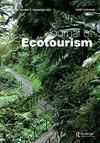野生动物保护区的动物正义空间:后人类视角
IF 2.4
Q2 HOSPITALITY, LEISURE, SPORT & TOURISM
引用次数: 3
摘要
关于人类世时代的争论愈演愈烈,促使人们对人类和非人类动物之间的关系进行批判性反思。本文从后人类视角反思了野生动物保护区的动物正义空间。我们对野生动物保护区的看法依赖于后人道主义及其潜力,即为非人类中心的正义方法提供新的认识论和理论基础。在这样做的过程中,我们还借鉴了动物地理学和空间社会学的概念。与后人文主义相一致,我们采用了一种受多元化、开放性、跨学科性和创造性启发的方法论。我们的叙事方法结合了主题分析、小插曲和叙事分析的特点。我们的发现挑战了野生动物保护区作为野生动物理想“公正”空间的观念,并对人类和非人类动物之间的互动提出了后人类的立场,为后者寻求正义。本文章由计算机程序翻译,如有差异,请以英文原文为准。
The space of animal justice in wildlife sanctuaries: a posthuman perspective
The growing debate on the Anthropocene epoch urges a critical reflection on the relationship between human and non-human animals. This paper reflects on the space of animal justice in wildlife sanctuaries from a post-human perspective. Our perspective on wildlife sanctuaries relies on posthumanism and its potential in terms of offering both a new epistemology and a theoretical grounding for an approach to justice that is not anthropocentric. In so doing, we also draw on concepts of animal geography and the sociology of space. In line with posthumanism, we adopt a methodology inspired by pluralism, openness, interdisciplinarity and creativity. Our narrative approach combines a thematic analysis with vignettes and features of narrative analysis. Our findings challenge the perception of wildlife sanctuaries as an ideal ‘just’ space for wildlife and present a posthuman stance on interaction between human and non-human animals, seeking justice for the latter.
求助全文
通过发布文献求助,成功后即可免费获取论文全文。
去求助
来源期刊

Journal of Ecotourism
Social Sciences-Geography, Planning and Development
CiteScore
6.40
自引率
12.50%
发文量
32
期刊介绍:
The Journal of Ecotourism seeks to advance the field by examining the social, economic, and ecological aspects of ecotourism at a number of scales, and including regions from around the world. Journal of Ecotourism welcomes conceptual, theoretical, and empirical research, particularly where it contributes to the dissemination of new ideas and models of ecotourism planning, development, management, and good practice. While the focus of the journal rests on a type of tourism based principally on natural history - along with other associated features of the man-land nexus - it will consider papers which investigate ecotourism as part of a broader nature based tourism, as well as those works which compare or contrast ecotourism/ists with other forms of tourism/ists.
 求助内容:
求助内容: 应助结果提醒方式:
应助结果提醒方式:


